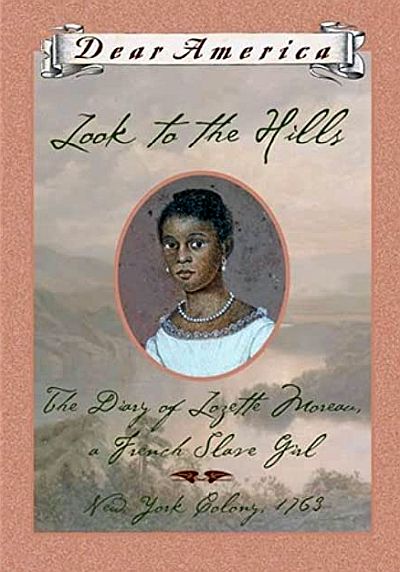
Look to the Hills, by Patricia C. McKissack

What a different story of a young slave girl in France who ends up here in French Canada, Maine, and New York. This is another diary from the Dear America Series by Scholastic from 1763. The “peculiar institution” in France had very educated companions for their elite. Lozette Moreau, a French slave girl, learned French, English and a third language in order to mingle as a companion.
I was familiar with our American colonies “peculiar institution” of slavery distinguishing house slaves from those in the field. Often house slaves were taught to read, etc. But the French had a different organization for their companion slaves. She is pictured on the cover wearing pearl earrings, necklace and lace trimmed gown.
It was a diary of very strange turns with her move from Aix-en-Provence to Canada as her owner chose to move. Freedom was new to this slave girl upon crossing the Atlantic. She realized how tenuous her very life was with “real work” in the New World was expected of slaves.
Every move meant she was not sure if she would remain a companion or be sold at her owner’s whim. Conversations between the two are heartfelt in this diary:
So Captain Woolridge and a detail of English soldiers will be traveling to Fort Niagara with Father Bernard and Armand, who are Catholic and Protestant, Marie-Louise, who is French, Paul Joseph, an Indian, and me, an African slave. We have to be in a fantasy land, because this combination of people would never be able to travel together in Europe.
Code Noir was a legal document in France that spelled out the masters’ responsibilities and the slaves’ rights. Quite different from the colonies developing across the wide ocean. Spilling salt was a cause for beating in the New World. Quite different systems, even though the Caribbean slaves were often mistreated by the French.
I was rapidly learning that slavery is a monster with many heads. It doesn’t matter if the monster speaks French, English, Dutch, Spanish, or Portuguese: The result is the same.
Here in the New World, French trappers often had one or two slaves as assistants who acted as protectors in the wilds. “Historians mark 1763 as a pivotal year in American history. It was the end of the Colonial Period and the beginning of the American Revolutionary Period.”
McKissack has written more than ninety books for young adults and earned many awards. I suggest that mature readers as well can learn history from this Dear America Series and share it with a young person.
Download Full Newspaper: High Res | Low Res (Details…)
<— Previous Article • Summaries • Next Article —>
©2022 by Summertime in the Belgrades. All rights reserved.